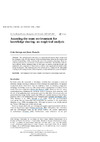Please use this identifier to cite or link to this item:
https://accedacris.ulpgc.es/jspui/handle/10553/76992
| DC Field | Value | Language |
|---|---|---|
| dc.contributor.author | Zárraga, Celia | en_US |
| dc.contributor.author | Bonache, Jaime | en_US |
| dc.date.accessioned | 2020-12-27T09:58:12Z | - |
| dc.date.available | 2020-12-27T09:58:12Z | - |
| dc.date.issued | 2003 | en_US |
| dc.identifier.issn | 0958-5192 | en_US |
| dc.identifier.other | WoS | - |
| dc.identifier.uri | https://accedacris.ulpgc.es/handle/10553/76992 | - |
| dc.description.abstract | The self-managed work team is an organizational structure that is much used by companies today. It is put forward as the most appropriate setting for the creation and transfer of knowledge, while protecting the source of competitive advantage. However, achieving efficiency in a work team is not without its difficulties. The literature indicates that a suitable climate minimizes these. In this study, we analyse, both theoretically and empirically, the components of that climate as well as some organizational initiatives that favour its presence. The empirical study was carried out on a sample of 363 individuals working in self-managed teams within companies, mostly multinationals, located in Spain. | en_US |
| dc.language | eng | en_US |
| dc.relation.ispartof | International Journal of Human Resource Management | en_US |
| dc.source | International Journal of Human Resource Management [ISSN 0958-5192], v. 14 (7), p. 1227-1245, (Noviembre 2003) | en_US |
| dc.subject | 5302 Econometría | en_US |
| dc.subject.other | Self-Managed Work Teams | en_US |
| dc.subject.other | Transfer And Creation Of Knowledge | en_US |
| dc.subject.other | High Care | en_US |
| dc.title | Assessing the team environment for knowledge sharing: an empirical analysis | en_US |
| dc.type | info:eu-repo/semantics/Article | en_US |
| dc.type | Article | en_US |
| dc.identifier.doi | 10.1080/0958519032000114282 | en_US |
| dc.identifier.scopus | 0344287078 | - |
| dc.identifier.isi | 000185506500009 | - |
| dc.contributor.authorscopusid | 10041560200 | - |
| dc.contributor.authorscopusid | 6603811866 | - |
| dc.description.lastpage | 1245 | en_US |
| dc.identifier.issue | 7 | - |
| dc.description.firstpage | 1227 | en_US |
| dc.relation.volume | 14 | en_US |
| dc.investigacion | Ciencias Sociales y Jurídicas | en_US |
| dc.type2 | Artículo | en_US |
| dc.contributor.daisngid | 33312344 | - |
| dc.contributor.daisngid | 1964859 | - |
| dc.description.numberofpages | 19 | en_US |
| dc.utils.revision | Sí | en_US |
| dc.contributor.wosstandard | WOS:Zarraga, C | - |
| dc.contributor.wosstandard | WOS:Bonache, J | - |
| dc.date.coverdate | Noviembre 2003 | en_US |
| dc.identifier.ulpgc | Sí | en_US |
| dc.description.jcr | 0,423 | |
| dc.description.jcrq | Q4 | |
| dc.description.ssci | SSCI | |
| dc.description.erihplus | ERIH PLUS | |
| item.fulltext | Con texto completo | - |
| item.grantfulltext | open | - |
| Appears in Collections: | Artículos | |
SCOPUSTM
Citations
180
checked on Jun 8, 2025
WEB OF SCIENCETM
Citations
141
checked on Jun 8, 2025
Page view(s)
255
checked on May 31, 2025
Download(s)
867
checked on May 31, 2025
Google ScholarTM
Check
Altmetric
Share
Export metadata
Items in accedaCRIS are protected by copyright, with all rights reserved, unless otherwise indicated.
